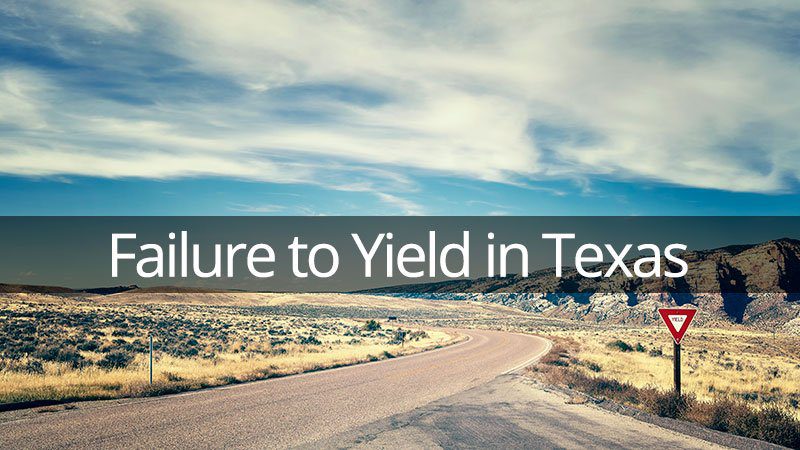Failure to yield the right of way in many states is a confusing subject. While there are specific laws pertaining to this in Texas, it’s still a gray area that relies more on instinct than regulation.
Accidents resulting in intersections are deadly when drivers are entering oncoming traffic, misunderstanding the right of way laws can spell catastrophe.
Failure to Yield Right of Way Laws
There are many laws to understand about the right of way, and as soon as a motorist starts driving, they must follow them.
The Texas transportation code 545.153 covers all the details of yielding to other motorists and pedestrians.
- Section 544.003 states that a stop sign or yield sign indicates preferential right-of-way at an intersection.
- Section 544.010 says that unless otherwise directed by a police officer or traffic controlled device, drivers will yield the right-of-way to a vehicle that has entered an intersection from another roadway or closely approach, making it a hazard or obstruction to the operator’s movement in or across the intersection.
- When approaching a yield sign, the driver must slow down and observe oncoming traffic before entering the new roadway.
What Is Failure to Yield the Right of Way?
In the Lonestar state, there are rules and regulations regarding the right of way at intersections. When someone chooses not to obey these laws, it can result in an accident leading to injury and even death.
All drivers must understand failure to yield, right of way, and the laws associated with the two in Texas.
Here are some of the most common violations in the state:
- If you’re the driver of a motor vehicle on an unpaved road, it’s always your responsibility to yield to drivers on paved roads.
- When approaching an intersection not controlled by a stop sign or light, you’re required to yield to all vehicles moving through the intersection and on your right.
- Drivers making a left must yield to all pedestrians and traffic.
- When making a right, the driver must yield to traffic entering the same lane or pedestrian crossing.
- Anyone exiting a parking lot, driveway, or private road should yield to drivers already on the roadway.
- Trains always have the right of way on railways.
Failing to Yield to Pedestrians
A 2017 report from the Texas DOT showed that 615 pedestrians were killed due to a motor vehicle accident. A majority of these occurred at intersections due to confusion over who has the right of way.
It’s the driver’s responsibility to look out for pedestrians no matter where they’re crossing. It doesn’t matter if the person walking is jaywalking, crossing behind a car, or walking the road in the middle of the dark. The pedestrian will always have the right of way, and the driver must yield to someone crossing the road.
Here are some examples that might surprise you:
- If a crosswalk sign tells the pedestrian to stop and you have a green light, the walker still has the right of way, and you must yield.
- When approaching a red light to make a right turn, the pedestrian crossing has the right of way.
- Even if you’re driving through a two-lane road without a stop sign or light, the pedestrian still has the right of way if they attempt to cross.
Failure to Yield to an Emergency Vehicle in Texas
Many people wonder if it’s a legal requirement to yield or pull over when approached by an emergency vehicle.
According to Sections 547.305 and 547.702, when you are approached from behind by an emergency vehicle using audible and visual signals, you must yield the right of way, immediately move off the road to the right side edge or curb to clear the roadway, and remain there until the vehicle has passed.
These laws also include yielding to police vehicles lawfully using their signals to attempt to pass.
Of course, the law does not exempt operators from following laws regarding the safety of all motorists and pedestrians on the roadway.
What Causes Failure to Yield Tickets in Texas?
Much of the time, a failure to yield accident is the result of negligent driving. One driver might not have been paying attention to the road or oncoming traffic at an intersection, leading to a potentially deadly accident.
Another cause of accidents at intersections is a lack of understanding of the laws.
The previous section should help clear that up.
Many people don’t know who actually has the right of way on the road, which leads to confusion and ultimately, accidents.
If you’ve ever faced a situation where two drivers are continuously waving one on, you’ll understand what we’re talking about here.
Because of this, many cases must be analyzed by an attorney using the Texas transportation code.
Is Failure to Yield a Crime in Texas?
Failing to yield in the Lonestar state is a crime and one that can carry harsh penalties if you’re found guilty.
It depends a lot on the extent of the crime and the end result of the accident. Many issues can come as a result of failing to yield, causing a car wreck.
What Is the Punishment for Failing to Yield?
If you’re determined liable for an accident resulting from failing to yield, it is a criminal offense. You’ll find yourself with fines totaling as high as $2,000 if the other driver experienced injuries as a result. If the driver received a severe injury, the fines could climb as high as $4,000.
Failing to yield doesn’t always have to result in an accident for there to be a punishment.
In some cases, a police officer may witness a driver failing to yield correctly and issue them a failure to yield ticket.
These tickets should not cost more than your standard traffic citation, and based on the extent of the situation can cost between $50-$250 dollars.
Do You Get Points for Failure to Yield Tickets?
While it does depend on the individual scenario, you will most likely receive points on your license.
The amount of points depends on the judgment and the extent of negligence. There’s always the factor of distraction or impairment that can cause you to receive more points.
Does a Failure to Yield Ticket Affect My Insurance?
As with any motor vehicle accident, the chances that your insurance rates will increase after are always apparent.
In addition to receiving a ticket, fines, court hearings, you can also receive that unwanted letter from your insurance company with new rates due to your “high risk†status.
Can a Failure to Yield Ticket Get Dismissed?
The short answer is yes, but it’s much more complicated than that.
In most cases, it’s more economical and logical to face the music and accept the failure to yield ticket but appeal it in court to try and receive fewer points.
In many cases, a failure to yield ticket results in three points, but if you show up to the court hearing, you can get it lowered to one point.
These rules only apply to situations that did not result in bodily injury. If you merely “pulled out in front of someone,†and they had to slow down a little, you can likely get the ticket reduced to one point.
You can fight it by hiring a personal injury lawyer if you feel that you were not responsible for the accident.
Failure to Yield Resulting in an Accident: Understand Your Rights
Many people have questions regarding car accidents and their rights regardless of what side of the argument you’re on.
If you’re the victim of a right of way accident, it’s important that you understand the steps you need to take to maintain a solid claim and prevent anyone from taking advantage of you:
- Call the police immediately and have them file a report.
- Tell the officer that you would like immediate medical attention for wounds and trauma.
- Gather all the contact information from the driver and any witnesses.
- Take pictures of the accident as soon as possible. This includes skid marks, injuries, vehicle damage, time of day, and weather.
- Contact a car accident lawyer as soon as you can to protect your rights.
If you feel that you might be responsible for a failure to yield right of way accident, don’t panic. Remain calm, check on any injured parties, and follow many of the same steps above.
If the accident occurred and someone is blaming you for it, you have rights as well.
You need to follow the same steps to protect yourself and remove responsibility from your back in the situation. If you believe the other person is responsible, do not argue or escalate the scenario.
Let law enforcement do their job and mediate the incident, and the justice system will take over from there.
No matter what, you also need to call a lawyer specializing in accidents, wrecks, and personal injury.
Do You Need Legal Assistance?
If you feel that you’ve either been injured or accused due to a failure to yield accident, you have a right to experienced representation.
The personal injury lawyers at Hutchinson and Stoy are here to ensure you get the justice or protection you deserve.














